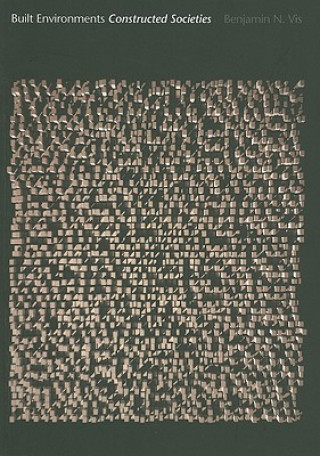
Kód: 05055638
Built Environments, Constructed Societies
Autor B.N. Vis
Archaeology, as the discipline that searches to explain the development of society by means of material remains, has been avoiding the big issues involved with its research agenda. The topic of social evolution is concealed by anx ... celý popis
- Jazyk:
 Angličtina
Angličtina - Vazba: Brožovaná
- Počet stran: 192
Nakladatelství: Sidestone Press, 2009
- Více informací o knize

Mohlo by se vám také líbit
-

Dune
216 Kč -

Haunting Adeline
621 Kč -

Berserk Deluxe Volume 2
1092 Kč -

White Nights
89 Kč -

Powerless
268 Kč -

Atomic Habits
330 Kč -

Dune Messiah
228 Kč -

Berserk Deluxe Volume 3
1142 Kč -

One Day
221 Kč -

Berserk Deluxe Volume 1
1115 Kč -

Iron Flame
368 Kč -

Surrounded by Idiots
213 Kč -

Harry Potter and the Prisoner of Azkaban (Minalima Edition)
993 Kč -

Gravity Falls Journal 3
441 Kč -

Heaven Official's Blessing: Tian Guan Ci Fu (Novel) Vol. 1
420 Kč -

The Creative Act
568 Kč -

Dune
276 Kč -

Hunting Adeline
624 Kč -

A Little Life
290 Kč -

Children of Dune
230 Kč -

Heaven Official's Blessing: Tian Guan Ci Fu (Novel) Vol. 2
427 Kč
Darujte tuto knihu ještě dnes
- Objednejte knihu a zvolte Zaslat jako dárek.
- Obratem obdržíte darovací poukaz na knihu, který můžete ihned předat obdarovanému.
- Knihu zašleme na adresu obdarovaného, o nic se nestaráte.
Více informací o knize Built Environments, Constructed Societies
Nákupem získáte 80 bodů
 Anotace knihy
Anotace knihy
Archaeology, as the discipline that searches to explain the development of society by means of material remains, has been avoiding the big issues involved with its research agenda. The topic of social evolution is concealed by anxiety about previous paradigmatic malpractice and the primary archaeological division of the world in culture areas still suffers from the archaic methods by which it was established. Archaeological inference of developing societies is weighed down by its choice of particularism within agency approaches and overtly reductionist due to the prevalence of statistical, classificatory and biological approaches. This book addresses these issues through a perspective on the spatial analysis of the built environment. As one of the principal properties of our dataset, as well as being the first materialisation of sociality, such specialities are suggested to be a fundamental key for enabling an understanding of the developing social identity of places, regions and areas. In order to arrive at a truly social inference of spatial datasets, archaeology's usual analysis working from material remains towards socio-cultural interpretations needs to be inverted. The vantage point of this study consists of aprioristic social theory. It constructs its arguments through an epistemological foundation comprising a selection of essential ideas regarding the three constitutive axes of developing societies: time, human action and human space. As it recognises the inherent position of these axes combined in the discipline of human geography, a historical comparison of these two disciplines presents the angle from which plausible theoretical advancements can be made. The core of the book explores selected works of human geographers Allan Pred, Benno Werlen and Andreas Koch against the backdrop of theories like structuration or systems theory, phenomenology, action theory, and to a lesser extent Actor Network Theory and autopoiesis. From this follows its own theoretical proposal called the social positioning of spatialities. On this basis hypotheses for methodological opportunities are discussed, establishing a research agenda. Firmly placing its efforts in current paradigmatic debates in the discipline, this study offers archaeological theorists an incentive to leave the safety of materially bound science and adapt an alternative perspective. It is an attempt to put archaeology back in the forefront of the social theoretical debates it should contribute to.
 Parametry knihy
Parametry knihy
Zařazení knihy Knihy v angličtině Humanities Archaeology Archaeology by period / region
799 Kč
- Plný název: Built Environments, Constructed Societies
- Autor: B.N. Vis
- Jazyk:
 Angličtina
Angličtina - Vazba: Brožovaná
- Počet stran: 192
- EAN: 9789088900389
- ISBN: 9088900388
- ID: 05055638
- Nakladatelství: Sidestone Press
- Hmotnost: 431 g
- Rozměry: 257 × 182 × 13 mm
- Datum vydání: 22. December 2009
Osobní odběr Praha, Brno a 12903 dalších
Copyright ©2008-24 nejlevnejsi-knihy.cz Všechna práva vyhrazenaSoukromíCookies



 Vrácení do měsíce
Vrácení do měsíce 571 999 099 (8-15.30h)
571 999 099 (8-15.30h)